Riotoro Onyx 650W PSU Review
Why you can trust Tom's Hardware
Cross-Load Tests & Infrared Images
Our cross-load tests are described in detail here.
To generate the following charts, we set our loaders to auto mode through our custom-made software before trying more than 25,000 possible load combinations with the +12V, 5V and 3.3V rails. The load regulation deviations in each of the charts below were calculated by taking the nominal values of the rails (12V, 5V and 3.3V) as point zero. The ambient temperature was between at 30°C (86°F) to 32°C (89.6°F).
Load Regulation Charts
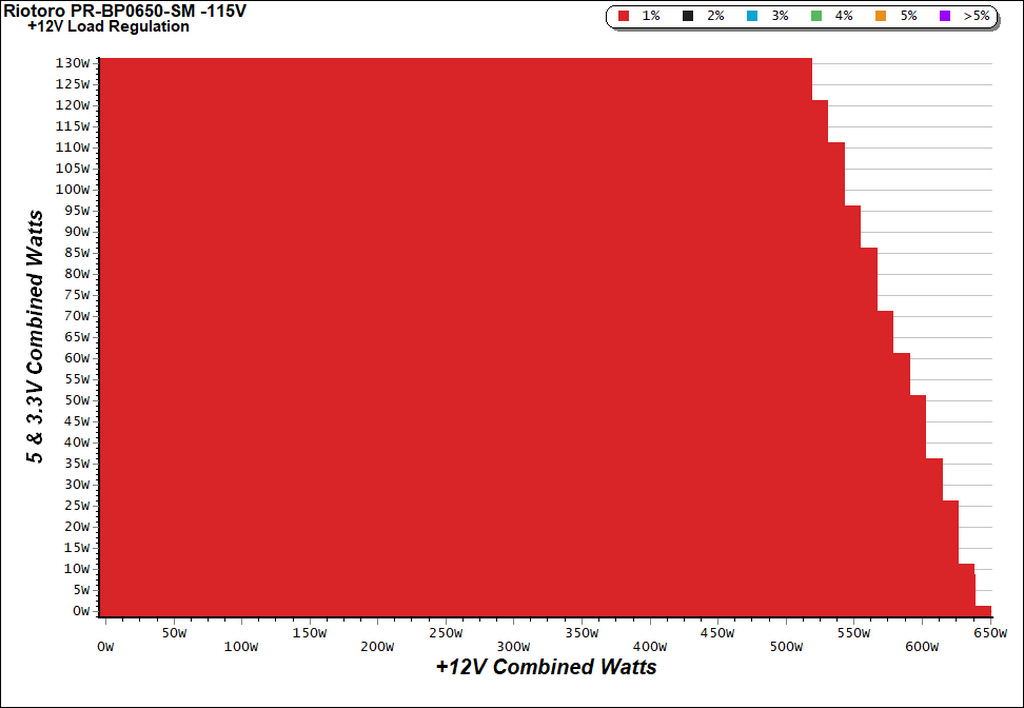
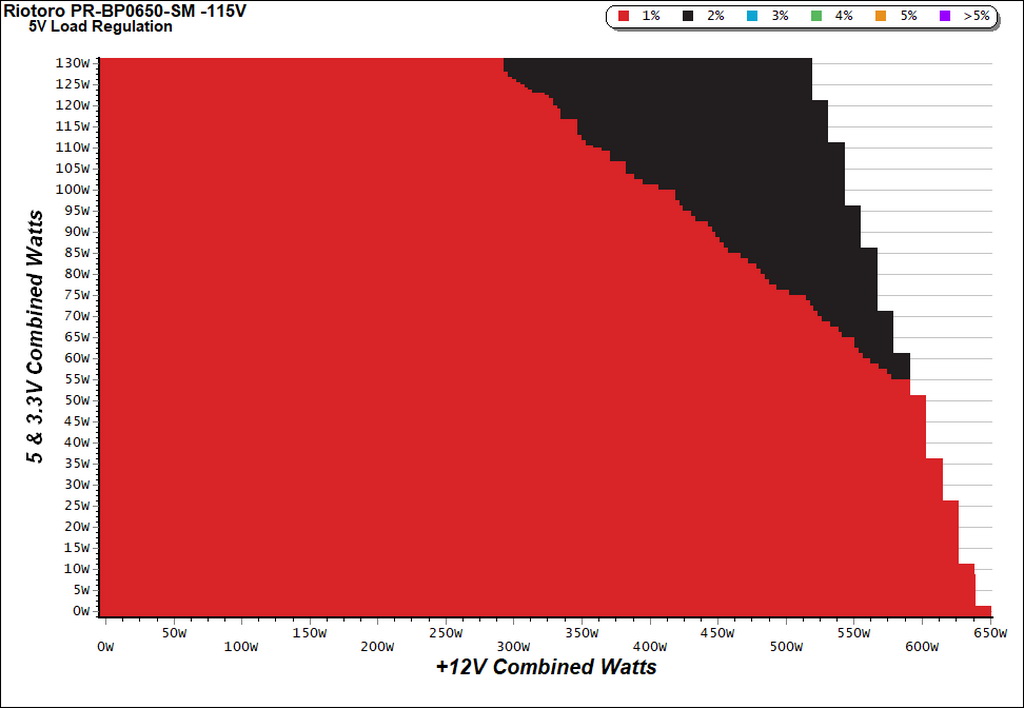
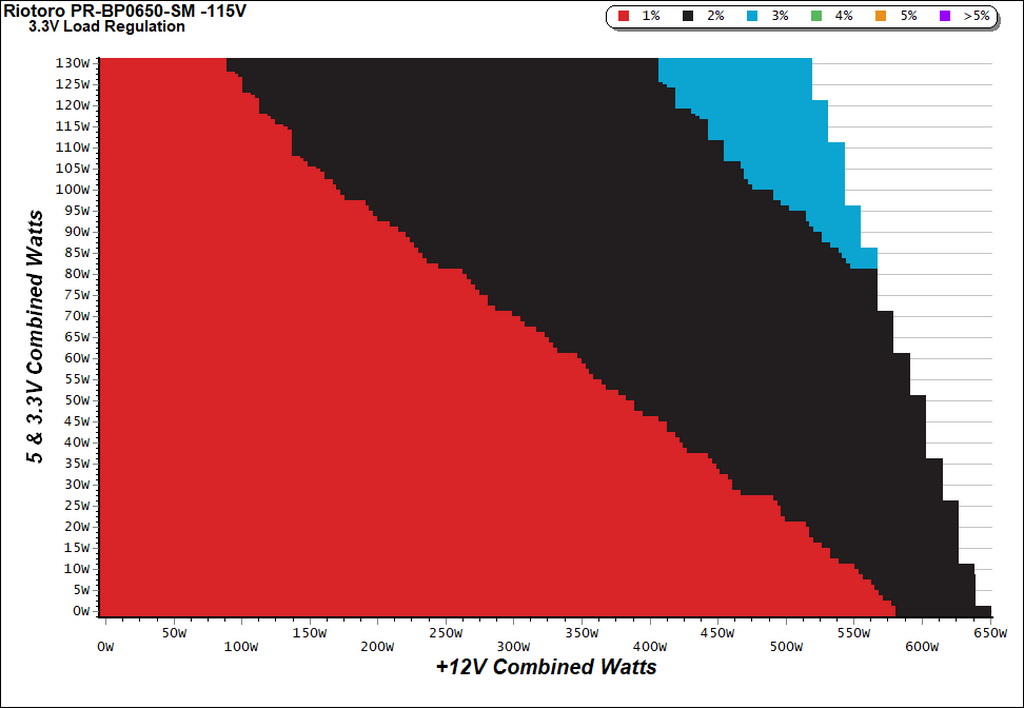
Efficiency Chart
Efficiency doesn't exceed 90% with any load combination, as you can see in the chart above.
Ripple Charts
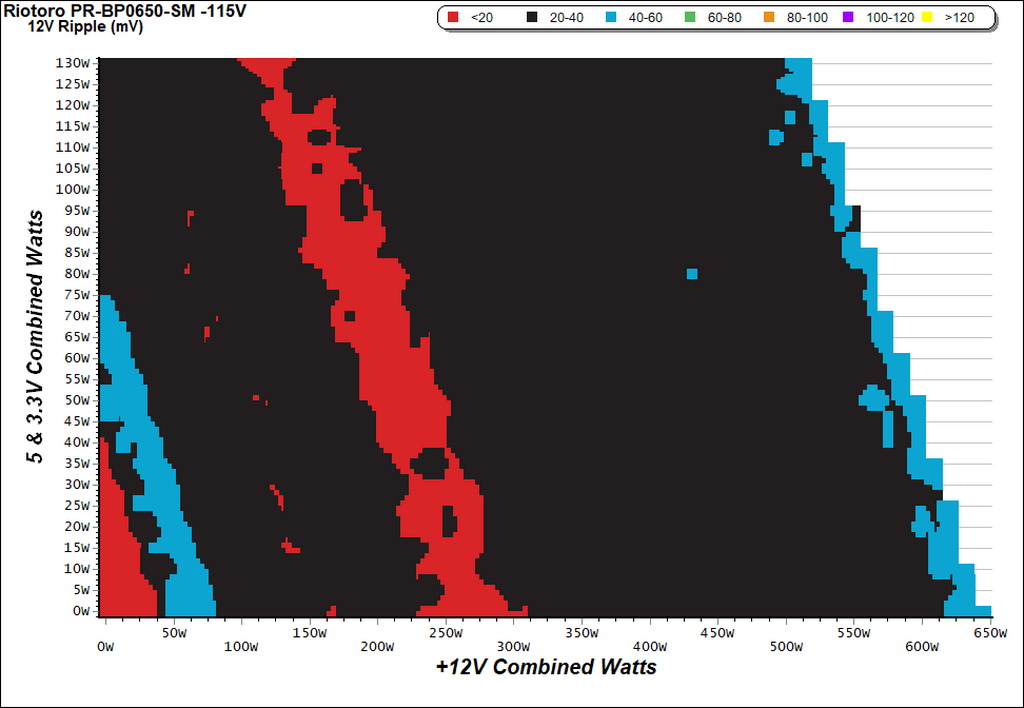
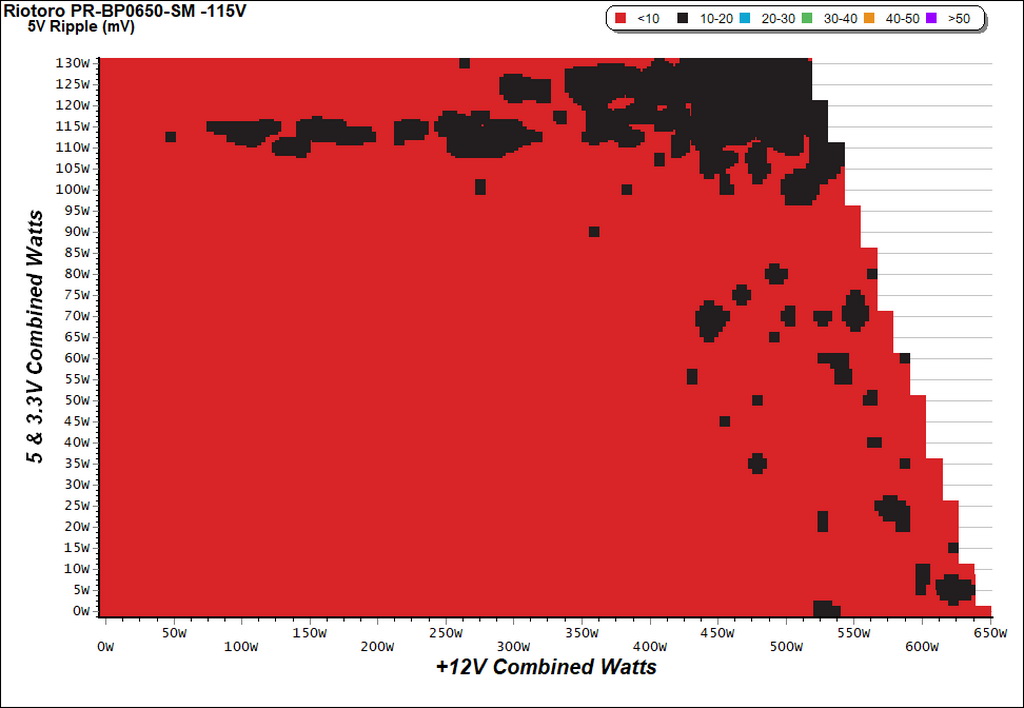
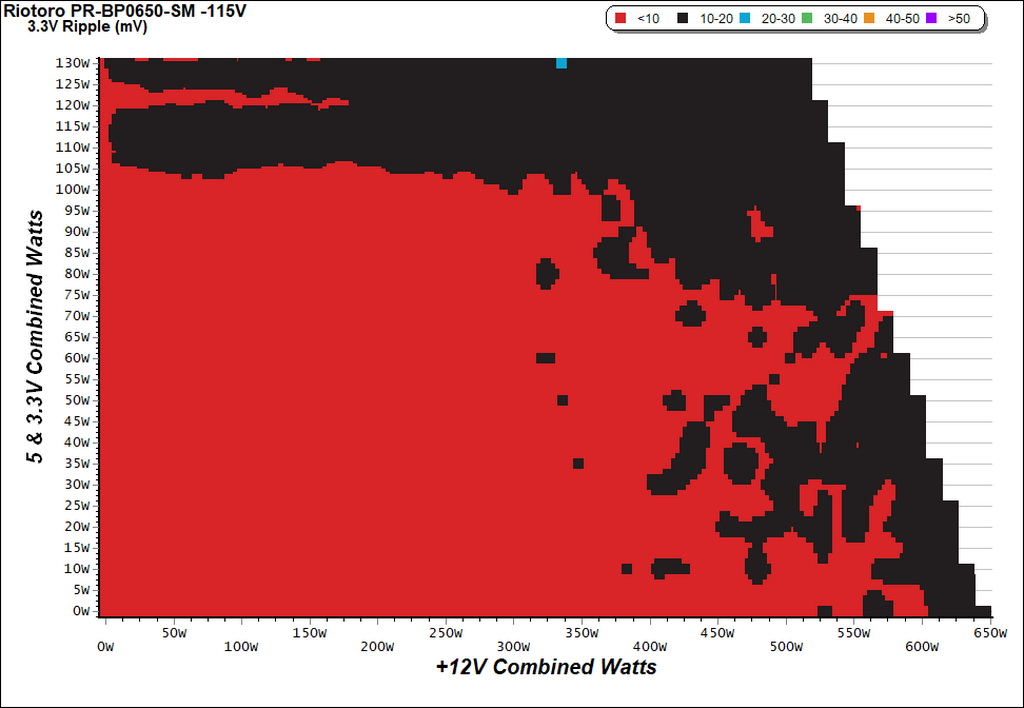
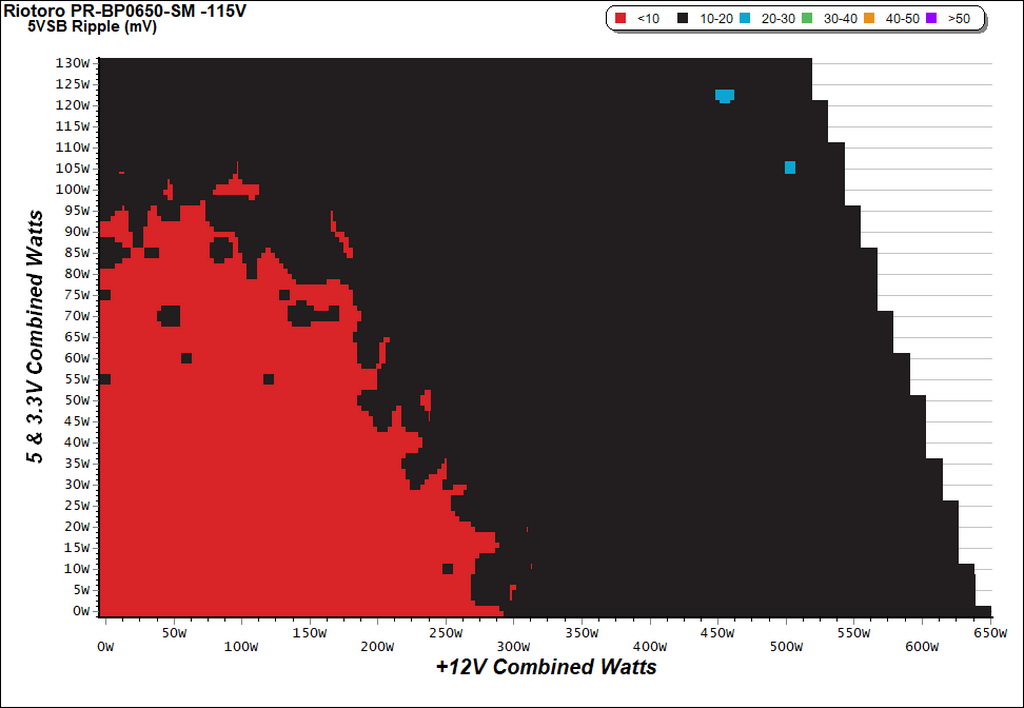
Infrared Images
We applied half-load for 10 minutes with the PSU's top cover, along with its cooling fan, removed before taking photos with our modified FLIR E4 camera that delivers 320x240 IR resolution (76,800 pixels).
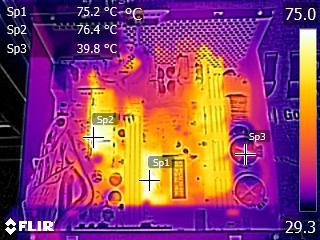
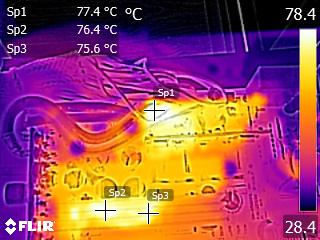
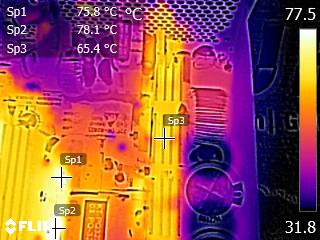
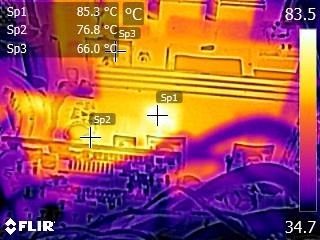
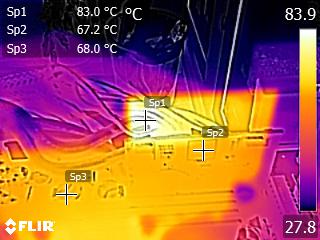
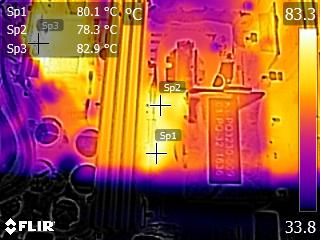
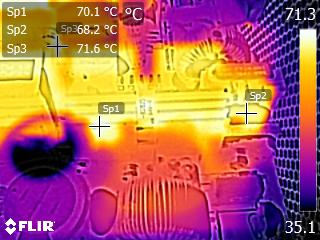
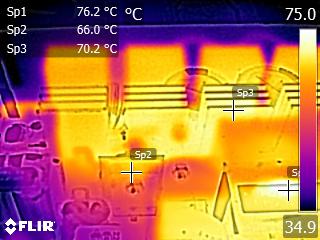
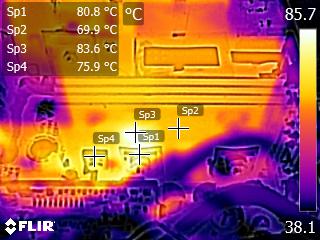
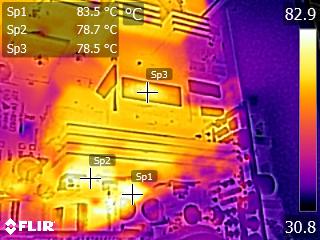
After 10 minutes with the PSU operating fanless under a mid-range load, its internals are quite hot. Efficiency isn't good enough at this level to allow for prolonged passive operation. That's probably why QW made the fan profile so aggressive.
MORE: Best Power Supplies
MORE: How We Test Power Supplies
Get Tom's Hardware's best news and in-depth reviews, straight to your inbox.
MORE: All Power Supply Content
Current page: Cross-Load Tests & Infrared Images
Prev Page Protection Features Next Page Transient Response Tests
Aris Mpitziopoulos is a contributing editor at Tom's Hardware, covering PSUs.
-
turkey3_scratch I don't think it's so much the aggressiveness of the fan that contributes to the noise rather than the fact that it's just a noisy fan. There are many other fans that could be spinning at equal RPM and be much quieter while providing the same amount of cooling.Reply
Then again, the noise should not be too severe of a deal in a computer case with other fans (such as case fans at 100% always) contributing more significantly to the net noise.
Edit: Nevermind, dope move by me. I didn't realize the y axis started at 1400RPM, yep, that fan RPM is very high indeed. -
Ne0Wolf7 Reply20135612 said:I don't think it's so much the aggressiveness of the fan that contributes to the noise rather than the fact that it's just a noisy fan. There are many other fans that could be spinning at equal RPM and be much quieter while providing the same amount of cooling.
Then again, the noise should not be too severe of a deal in a computer case with other fans (such as case fans at 100% always) contributing more significantly to the net noise.
I agree, especially when you're like me and have six of them because you were obsessed with filling all of the fan slots on your first build (lol). When the noise finally got to me, I got creative with my intake/ output configuration, and set my PSU to ECO mode (which is no fan). The PSU started roasting, so I rebooted with the fan going and noticed no noise difference whatsoever and the PSU was much cooler (then again, my case fans are sleeve bearing, but still). -
turkey3_scratch Reply20135670 said:20135612 said:I don't think it's so much the aggressiveness of the fan that contributes to the noise rather than the fact that it's just a noisy fan. There are many other fans that could be spinning at equal RPM and be much quieter while providing the same amount of cooling.
Then again, the noise should not be too severe of a deal in a computer case with other fans (such as case fans at 100% always) contributing more significantly to the net noise.
I agree, especially when you're like me and have six of them because you were obsessed with filling all of the fan slots on your first build (lol). When the noise finally got to me, I got creative with my intake/ output configuration, and set my PSU to ECO mode (which is no fan). The PSU started roasting, so I rebooted with the fan going and noticed no noise difference whatsoever and the PSU was much cooler (then again, my case fans are sleeve bearing, but still).
I have a build with like 6 fans that gets noisy because the motherboard only supports so many fans, so I have to plug them into the PSU. But I also have a second build that is dead silent with some Noctuas, and that's the type of build I would want a very silent or at least semi-passive PSU in. -
Ne0Wolf7 Reply20135678 said:20135670 said:20135612 said:I don't think it's so much the aggressiveness of the fan that contributes to the noise rather than the fact that it's just a noisy fan. There are many other fans that could be spinning at equal RPM and be much quieter while providing the same amount of cooling.
Then again, the noise should not be too severe of a deal in a computer case with other fans (such as case fans at 100% always) contributing more significantly to the net noise.
I agree, especially when you're like me and have six of them because you were obsessed with filling all of the fan slots on your first build (lol). When the noise finally got to me, I got creative with my intake/ output configuration, and set my PSU to ECO mode (which is no fan). The PSU started roasting, so I rebooted with the fan going and noticed no noise difference whatsoever and the PSU was much cooler (then again, my case fans are sleeve bearing, but still).
I have a build with like 6 fans that gets noisy because the motherboard only supports so many fans, so I have to plug them into the PSU. But I also have a second build that is dead silent with some Noctuas, and that's the type of build I would want a very silent or at least semi-passive PSU in.
My ATX motherboard only has two fan headers, not sure who was in charge there, haha, but I bought two three way splitters so I could control the speeds. My side panel has two fan slots, and I can only use one of them because the CPU cooler, so I just have this lovely outlet for sound... Its really a blessing too beacsue I have two GPUs so one can never be tarved for air too much but still. A new case and fans are in my future somewhere. -
takeshi7 Can you review the Rosewill Hive 750W? I got one on sale for $60 recently and there aren't any recent reviews for it, and not from any that are as in depth as Tom's Hardware.Reply -
takeshi7 Reply
It's still relevant though. Especially because it's cheaper, more powerful, and has the same 80 Plus rating as this Riotoro unit.20143641 said:@takeshi7, there aren't new reviews for it because it isn't a new PSU. -
turkey3_scratch Reply20144799 said:
It's still relevant though. Especially because it's cheaper, more powerful, and has the same 80 Plus rating as this Riotoro unit.20143641 said:@takeshi7, there aren't new reviews for it because it isn't a new PSU.
"More powerful" can be interpreted many ways. What do you mean by that? -
takeshi7 Reply
I mean 750W > 650W.20144830 said:20144799 said:
It's still relevant though. Especially because it's cheaper, more powerful, and has the same 80 Plus rating as this Riotoro unit.20143641 said:@takeshi7, there aren't new reviews for it because it isn't a new PSU.
"More powerful" can be interpreted many ways. What do you mean by that? -
turkey3_scratch Reply20144901 said:
I mean 750W > 650W.20144830 said:20144799 said:
It's still relevant though. Especially because it's cheaper, more powerful, and has the same 80 Plus rating as this Riotoro unit.20143641 said:@takeshi7, there aren't new reviews for it because it isn't a new PSU.
"More powerful" can be interpreted many ways. What do you mean by that?
Eh, doesn't really mean much of anything if you ask me. It's just what they decided to rate it at. I don't think we'll ever see a Rosewill Hive review. They're older and newer units get reviewed instead.
A high quality lower wattage power supply can be more powerful than a lesser quality higher wattage power supply.
